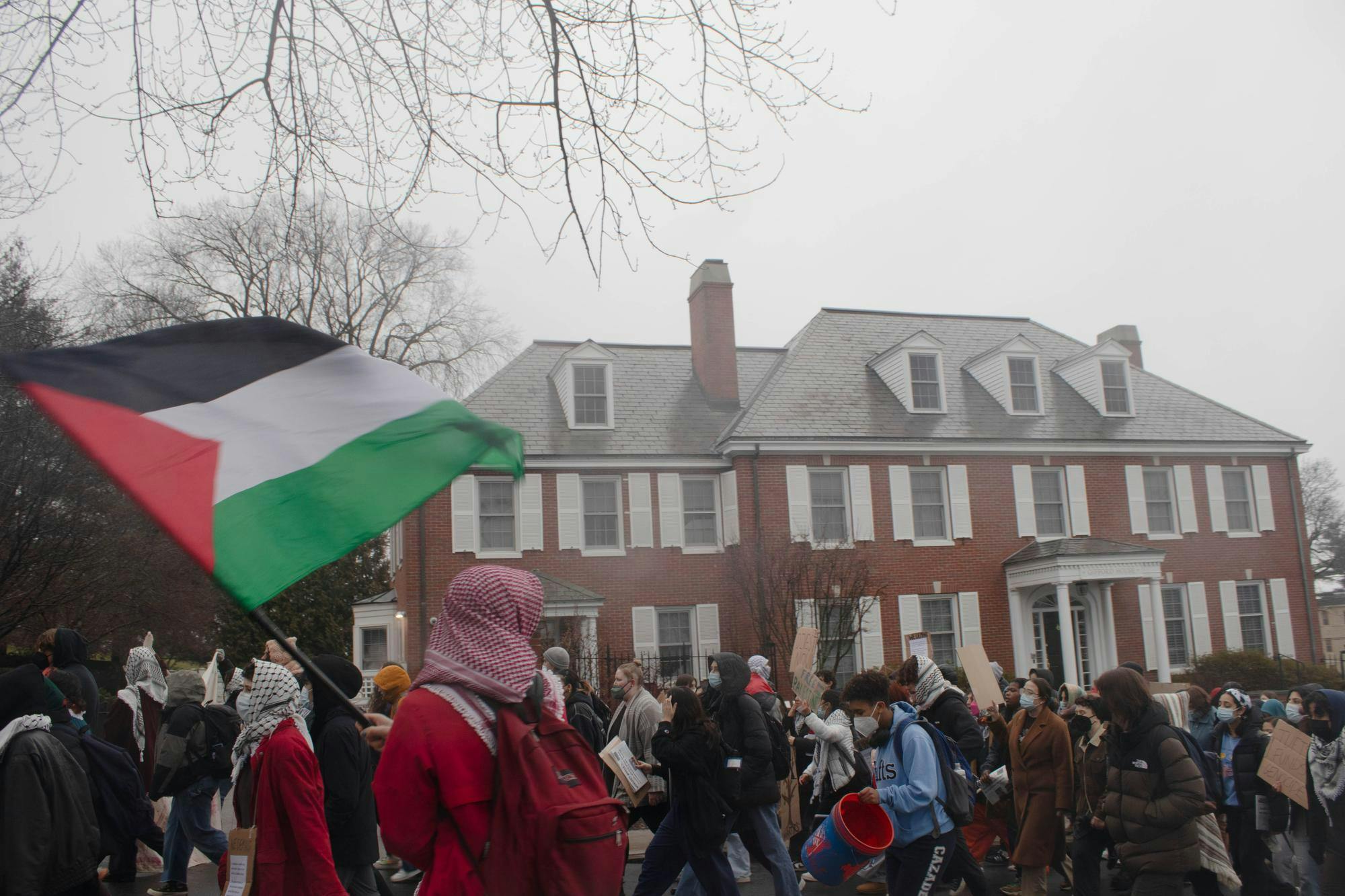More than 50 students gathered by the Mayer Campus Center’s lower patio and later marched through campus in an “emergency protest for Palestine” on Friday, organized by the Coalition for Palestinian Liberation at Tufts. The group’s first protest of 2024 follows a semester marked by activism over the Israel-Hamas war.
“We are here to reengage with our campaign to put pressure on the school to divest from israeli occupation of Palestine and apartheid,” CPLT wrote in a statement to the Daily. “There can be no business as usual on campus when every university in Gaza has been destroyed by the genocidal israeli assault on Gaza. From the River to the Sea, Palestine will be free.”
The protest — beginning just after 2 p.m. with speeches from several students — maintained a focus on worldwide resistance acts and historical social movements.
“The Palestinian people have an inherent and internationally recognized right to resist the forces that have represented decades of dispossession and violence,” a speaker said. “From agricultural warfare to blockades and constant surveillance, Palestine has been living through the genocide every day since [the establishment of the state of Israel in] 1948, paid for by our taxes. ... But settling in Palestine is a reminder that resistance groups everywhere have a right to reject their occupiers.”
The coalition — composed of several political, cultural and activist student organizations — has previously made demands of Tufts University and University President Sunil Kumar to condemn the Israel-Hamas war and divest from companies that contract with Israel, among other demands stated on its Instagram.
“We must take action to oppose our university’s investments in Israeli apartheid and refusal to respond to any of the demands of the Coalition for Palestinian Liberation,” the speaker said. “You, as students, have a moral obligation and a duty to show up in all the ways you can. … As we move into the spring semester, we would like to reiterate our demands as they guide our activism.”
The university declined to comment in response to Friday’s protest.
Another speaker addressed the historical and ongoing solidarity that Lebanon has shown Palestine.
“Lebanon has been under heavy bombardment and air attacks from the Israeli occupation forces,” a speaker said. “South Lebanon has sacrificed more than 200 martyrs. This includes resistance fighters, journalists and civilians, and among them my own family members. By neglecting to acknowledge and respect their martyrdom, we would be doing the ongoing fight for Palestinian freedom an injustice.”
In addition to describing resistance efforts abroad, the speaker brought attention to protester safety amid U.S. campus demonstrations.
“Israel’s military complex even appears on American college campuses,” the speaker said, referencing an incident at Columbia University in which students at a pro-Palestinian rally were allegedly sprayed with a chemical agent earlier this month, as first reported by the Columbia Spectator.
Students then referenced Friday’s ruling from the International Court of Justice, which ordered Israel to “take all measures within its power” to prevent genocidal acts in Gaza. Both South Africa and Indonesia have launched cases against Israel in the ICJ.
“This ruling does not order a ceasefire, and it cannot be enforced by outside government,” a speaker said. “Let us remind you that the United Nations and the framework of international law are two colonial institutions that will never liberate Palestine. Palestinian liberation will come by the Palestinian resistance.”
Following speeches, the group marched down Talbot Avenue, onto College Avenue, proceeded down Professors Row and eventually up Packard Avenue, concluding the protest outside of Olin Hall. While passing Gifford House, Kumar’s residence, they chanted calls of “Hey, Sunil, you can’t hide, you’re supporting genocide.”
Following the event, Students for Justice in Palestine hosted an event focusing on media bias in covering Palestine, spotlighting ways in which media outlets influence public opinion.
“I think the main goal from my understanding was — coming back from break — to bring attention back to admin and back to the rest of the student body,” a protester said in an interview with the Daily. “This isn’t something that’s going to go away. This genocide is still ongoing and people are still dying. So it’s really important that coming back from break, we continue raising awareness of what’s happening.”
Editor’s note: An earlier version of this article misstated the scope of the SJP presentation. It is on media bias in covering Palestine, not the Israel-Hamas war.






